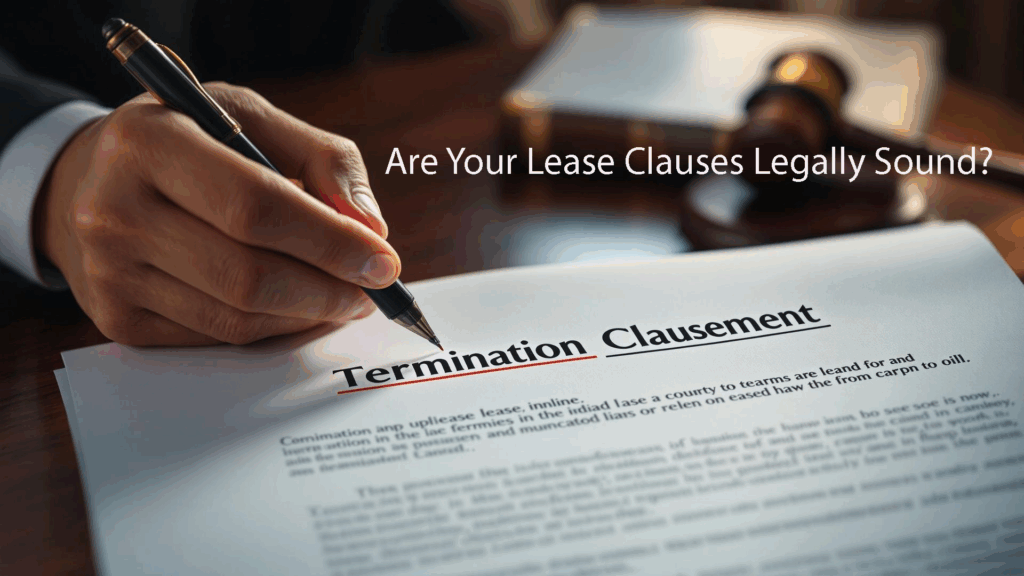Lease Agreement Clauses Under Legal Scrutiny: What Landlords Should Watch Out For
Understanding Which Lease Terms Could Be Challenged in Court—and How to Stay Compliant
As a landlord, your lease agreement is your first and most powerful line of defense. But in today’s evolving legal landscape, certain lease clauses are facing increased scrutiny from courts, tenant advocates, and regulatory agencies. Even a well-intentioned clause could be deemed unenforceable—or worse, expose you to costly litigation.
In this post, we’ll explore some of the most common lease agreement terms that are being legally challenged, why they matter, and how you can keep your lease contracts compliant, enforceable, and effective.
Note: This article is for informational purposes only and does not constitute legal advice.
Why Lease Clauses Matter More Than Ever
With the rise of tenant rights movements, evolving state and local laws, and a surge in post-pandemic litigation, lease agreements are under more scrutiny than ever. Courts are increasingly stepping in to strike down clauses that are overly broad, misleading, or place unfair burdens on tenants.
Landlords who rely on outdated or overly generic lease templates risk including clauses that can’t hold up in court—or that could trigger penalties for non-compliance.
Common Lease Clauses Facing Legal Challenges
1. Automatic Renewal Clauses
Clauses that automatically renew a lease without clearly notifying the tenant are now on shaky legal ground in many jurisdictions. Courts may void such clauses if tenants weren’t properly informed or didn’t actively consent.
Tip: If you include an auto-renewal clause, make sure it’s clearly stated and that you provide written notice well before the renewal date.
2. No-Pet or Breed Restriction Clauses
While landlords can typically enforce no-pet rules, issues arise when tenants request emotional support animals (ESAs). Federal and state fair housing laws protect tenants with disabilities—and attempting to ban an ESA can result in legal action.
Tip: Always make reasonable accommodations for tenants with documented ESAs, and avoid blanket restrictions that conflict with the law.
3. Early Termination Penalties
Charging excessive fees for early termination of a lease is increasingly being challenged. Courts may rule such fees as punitive rather than compensatory.
Tip: Keep early termination fees reasonable and tied to actual losses (like time to re-rent the unit).
4. Maintenance and Repair Responsibilities
Some landlords attempt to shift significant maintenance duties to tenants—like plumbing or appliance repair. But in many jurisdictions, courts find this violates habitability laws.
Tip: Make sure your lease doesn’t offload essential landlord duties, and clearly distinguish between tenant responsibilities (like minor upkeep) and landlord obligations (like structural or safety repairs).
5. Gag Clauses About Reviews or Complaints
Some landlords try to prohibit tenants from posting negative reviews or filing complaints. These clauses often violate consumer protection and free speech laws—and courts may consider them unconscionable.
Tip: Avoid any language that could be interpreted as silencing tenant feedback.
Tips for Drafting a Legally Compliant Lease
-
Use clear, simple language free of legal jargon.
-
Stay informed about federal, state, and local rental laws.
-
Avoid copying generic lease templates without review.
-
Periodically update your leases to reflect changes in the law.
-
Consult a legal professional to ensure your lease holds up in court.

How Ahmad Law Group Can Help
At Ahmad Law Group, we help landlords draft, review, and refine lease agreements that are not only legally sound—but tailored to their unique business and property needs. Our legal team stays on top of evolving housing laws so you don’t have to.
Whether you’re drafting your first lease or reviewing an existing one, we’ll help you protect your property, your profits, and your peace of mind.
➡️ Book your consultation today: ahmadlawgroup.com/contact-us
Conclusion
Your lease is more than a formality—it’s a legal contract that needs to be crafted with precision. As courts crack down on questionable clauses and tenants become more informed of their rights, landlords must be proactive and informed.
Take the time to review your lease agreement today—or reach out to Ahmad Law Group to ensure it’s working for you, not against you.
